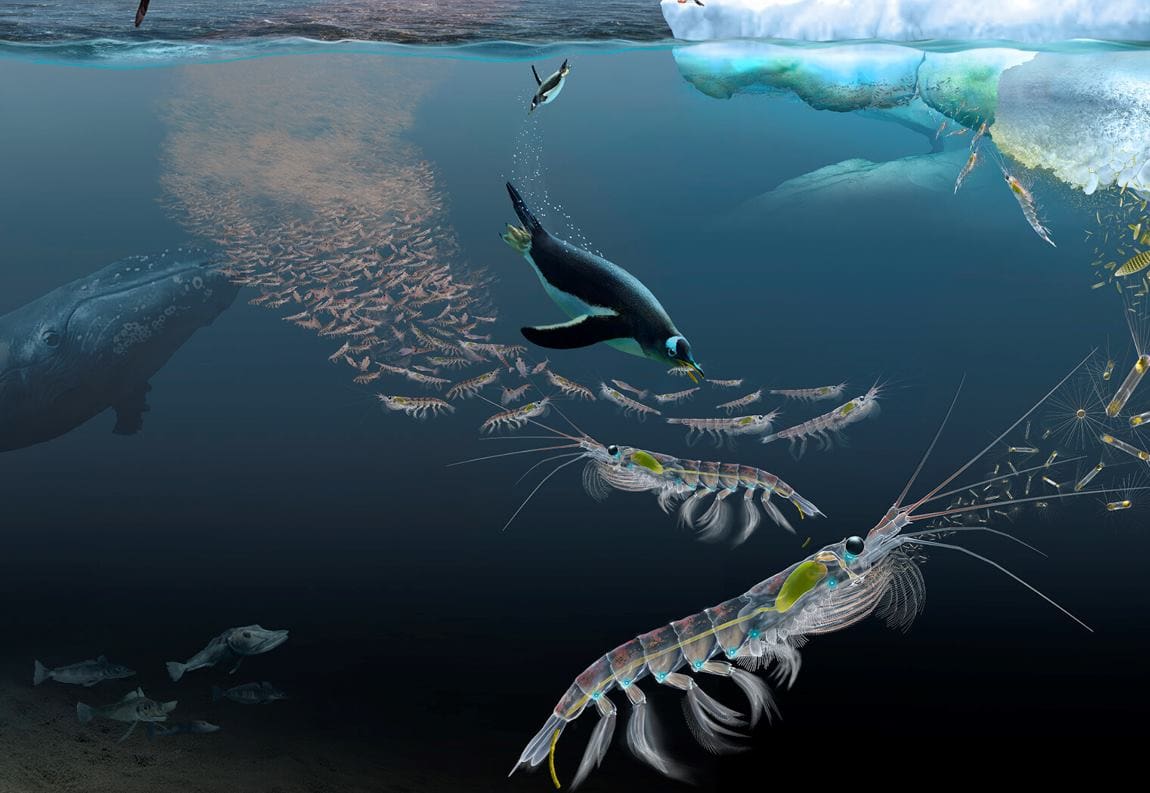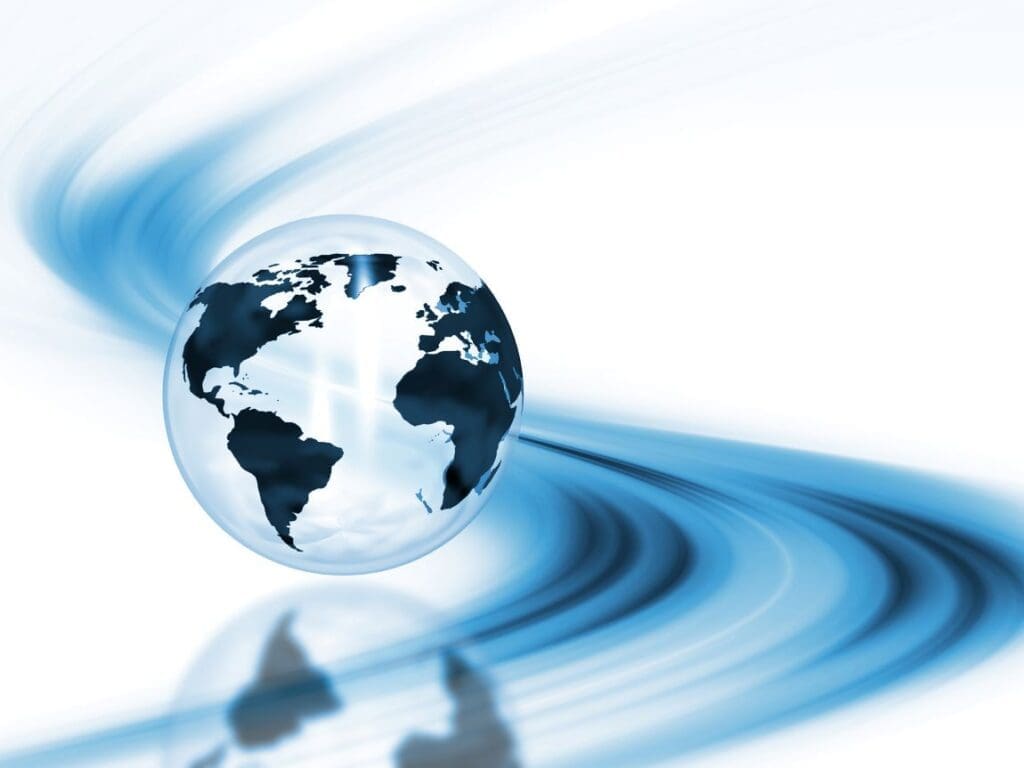Tiny Antarctic krill, key players in the Southern Ocean ecosystem, are as vital for carbon storage as mangroves and seagrasses, according to a new study. The research highlights that these small marine crustaceans store significant amounts of carbon, comparable to major coastal ‘blue carbon’ habitats. As krill populations face mounting threats from climate change and overfishing, the study argues they deserve the same protections as these better-known ecosystems.
The research, published in Nature Communications, reveals that Antarctic krill, though only around 6 cm long, play a pivotal role in locking carbon deep in the ocean.
Lead author Dr. Emma Cavan of Imperial College London explains that over the past decade, scientists have been uncovering krill’s critical role in carbon cycling. “This amazing finding (shows) that krill, and their poo, store similar amounts of carbon as some coastal marine plants,” says Dr. Cavan. “I hope this means we can now work towards conserving krill and their valuable Southern Ocean ecosystem with the same gumption as we are seagrasses and mangroves.”
The importance of krill in carbon storage
Krill are a central food source for larger Southern Ocean animals such as whales, seals, and penguins. They are also harvested by humans for food, bait, aquaculture, and dietary supplements. Despite their small size, krill play an outsized role in global carbon storage. The study shows that a single species of Antarctic krill annually locks away at least 20 million tonnes of carbon in the deep ocean. This figure is equivalent to a carbon storage value of $4-46 billion, depending on carbon pricing.
Krill feed on phytoplankton, microscopic plants that absorb atmospheric carbon during photosynthesis. When krill excrete waste or shed their exoskeletons, the carbon they have consumed sinks to the deep sea, where it can be stored for centuries. The depth at which krill waste must sink to ensure long-term carbon storage is surprisingly shallow, averaging just 381 meters.
Blue carbon and krill’s role
The term “blue carbon” refers to carbon captured by coastal ecosystems such as mangroves, seagrasses, and saltmarshes. However, as the new study points out, the ocean has other, lesser-known ways of storing carbon, with krill playing a major role.
Dr. Simeon Hill of the British Antarctic Survey, a co-author of the study, emphasizes that this discovery underscores humanity’s interconnectedness with this tiny creature: “This study shows how we as people are connected to a small creature in a remote location. We benefit from its actions in removing carbon but we also affect it through our own actions which drive climate change.”
The sheer number of krill further enhances their carbon storage potential. Krill form enormous swarms, sometimes over a kilometer in length, producing large amounts of fast-sinking waste. This waste, which can remain stored in the deep ocean for over 100 years, effectively locks carbon away from the atmosphere.
Krill at risk
Antarctic krill face significant challenges due to climate change and human activity. As the polar regions warm at an accelerated pace, the Southern Ocean ecosystem, including krill populations, is being altered. The expansion of krill fisheries further threatens this essential species.
Dr. Angus Atkinson from Plymouth Marine Laboratory, another co-author, points out that while krill are already recognized as a critical component of the Southern Ocean ecosystem and a target for fishing, this new study paints a more nuanced picture.
“Antarctic krill are well known for being at the centre of the unique Southern Ocean ecosystem and supporting an important fishery. But this study paints another picture of krill – on their key role in storing carbon,” says Dr. Atkinson.
Conservation implications
The study’s findings have significant implications for climate and conservation policies. As governments and organizations strive to meet climate goals, recognizing the value of marine animals like krill in carbon storage is critical.
Co-author Dr. Anna Belcher of the UK Centre for Ecology & Hydrology highlights the need to protect krill: “One of the amazing things about krill is that they form massive swarms, which can be over a kilometre in length. This drives a huge ‘rain’ of krill poo after feeding, making krill globally important for locking carbon away from the atmosphere. So, let’s make sure we look after these amazing crustaceans!”
Conserving krill populations is essential not only for the Southern Ocean ecosystem but also for their contribution to global carbon storage. The researchers advocate for including carbon storage in conservation policies to preserve krill populations and their habitats.
Dr. Cavan sums it up: “I hope .(..) we can work towards conserving krill and their valuable Southern Ocean ecosystem with the same gumption as we are seagrasses and mangroves.”
As krill populations continue to face external pressures, protecting this underappreciated carbon sink will be crucial for achieving climate goals and maintaining the health of the Southern Ocean ecosystem.
Journal Reference:
Cavan, E.L., Mackay, N., Hill, S.L., Atkinson, A., Belcher, A., Visser, A., ‘Antarctic krill sequester similar amounts of carbon to key coastal blue carbon habitats’, Nature Communications 15, 7842 (2024). DOI: 10.1038/s41467-024-52135-6
Article Source:
Press Release/Material by Imperial College London
Featured image: Illustration of krill in the Southern Ocean ecosystem. Artist: Glynn Gorick, reproduced from Hill et al. 2024 Credit: Hill et al. 2024 | DOI: 10.3389/fmars.2024.1307402




